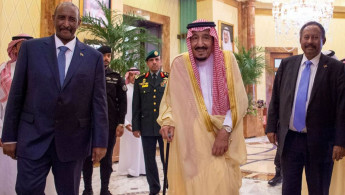Sudan's leaders visit Saudi King Salman in first official trip to Riyadh since taking office
General Abdul Fattah al-Burhan and Abdullah Hamdouk’s joint visit comes at the invitation of Saudi King Salman and marks the first time the two Sudanese officials travel to the kingdom since the formation of Sudan’s new civilian-military Sovereign Council.
The two leaders met with the king who renewed his backing for Sudan’s stability and prosperity, the official Saudi news agency SPA reported.
Sudan has since embarked on a transition to civilian rule following a power-sharing deal signed on August 17 by protest leaders and the generals who ousted Omar al-Bashir.
A civilian-military ruling body is now tasked with steering the country through a three-year transition period.
Before Bashir's ouster, Sudan had played a key role in supporting the regional interests of Saudi Arabia and its allies, with the autocrat overseeing a major foreign policy shift that saw Khartoum break its decades-old ties with Iran.
Sudanese opposition figures have called on their country's transitional government to bring back Sudanese soldiers fighting for the Saudi-led coalition in Yemen, including child soldiers and mercenaries, according to a report published last month/ Tuesday.
Spokesman for the Sudanese Professionals Association, El Rashid Saeed urged the country's new government to work towards ending the war in Yemen and bring Sudanese troops back home.
"We do not want the war to continue in Yemen," said Saeed in a press conference. "We want the talks to go on according to the plan prepared by the United Nations.
"I think Sudan can play a role in this regard through giving an ultimatum to its allies in the Arab coalition, for the sake of the peaceful solution that will guarantee the withdrawal of our forces without harming the relations with other countries."
At any time in the past four and a half years, as many as 14,000 Sudanese militiamen were fighting in Yemen with local militia aligned with the Saudis, according to an Al Jazeera report. Many of these, the report adds, were children and mercenaries.
There are "between 8,000 and 14,000 Sudanese paramilitary forces are fighting in Yemen", Noha Aboueldahab, from Brookings Doha Centre, told Al Jazeera.
"Sudanese mercenaries, many of them children from Darfur, have been lured into fighting on the ground in Yemen in exchange for financial compensation."
The decision to join the Saudi-led war against Houthis in Yemen was made by former dictator Omar al-Bashir, whose current trial revealed he received millions in illicit cash funds from Saudi Crown Prince Mohammed bin Salman.
Twitter Post
|
In December, The New York Times reported that Riyadh offered impoverished Sudanese families up to $10,000 to send their children to fight in Yemen.
"Families know that the only way their lives will change is if their sons join the war and bring them back money," the New York Times quoted one Sudanese child soldier as saying.
The report said that children made up at least 20 percent - and sometimes 40 percent - of the Sudanese battalion in Yemen.
Many had been brought in from the Darfur region of the west of Sudan, where some 300,000 people were killed and 1.2 million displaced during years of conflict. Saudi Arabia denied the reports earlier this year.
But despite the preogressive calls from a new Sudan, analysts believe the move is yet to be imposed.
"It is unlikely that anything will happen regarding a possible withdrawal of Sudanese soldiers from the Yemen conflict considering the transitional government is civilian-led and the armed forces are included within the council that came as a result of the agreement between the Sudanese opposition and the military," Yemen expert Mohammed al-Jaberi told The New Arab.
"The final say lies with the council itself and not the government and considering the strong connection between Hamiditi and Saudi Arabia and the UAE, it is unlikely for Sudanese forces to withdraw," he added.
"This is another clear example of the differences between the true powers that exist - the civil versus military."
It is estimated that hundreds of Sudanese have been killed in fighting in Yemen, in a conflict that has affected ordinary civilians as well as those from the highest ranks, among whom was the brother Houthi rebel chief Abdelmalik al-Houthi.
International stage
Sudan returned to the international stage last month when Hamdok visited the US and France to address the United Nations General Assembly and meet with French President Emmanuel Macron.
The Sudanese premier has also held key talks with rebel leaders in the South Sudanese capital Juba and Paris.
Among the transitional government's key goals are an end to conflict in the country and a solution for Sudan's ailing economy.
Hamdok seeks to acquire billions in financial aid to help shore up the country's finances but Sudan is currently blocked from receiving World Bank and International Monetary Fund assistance due to its continued listing on the US State Sponsors of Terrorism list.
Follow us on Twitter: @The_NewArab





 Follow the Middle East's top stories in English at The New Arab on Google News
Follow the Middle East's top stories in English at The New Arab on Google News
![Israeli forces ordered bombed Gaza's Jabalia, ordering residents to leave [Getty]](/sites/default/files/styles/image_330x185/public/2176418030.jpeg?h=a5f2f23a&itok=_YGZaP1z)

